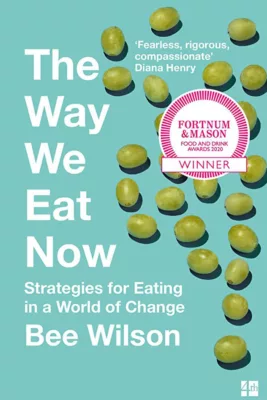
Wilson, Bee, and Annabel Lee. The Way We Eat Now: Strategies for Eating in a World of Change. London: 4th Estate, 2019.
I discovered Bee Wilson through Consider the Fork,1 an excellent ‘history of how we cook and eat’2 that draws heavily on Kranzberg’s Laws.3 Recently, I came across The Way We Eat Now, first published in 2019. While Consider the Fork examines the evolution of kitchen technology, this book explores how our relationship with food—and related cultural practices—has changed over time.
How we think about food is often a confusing mix of fad diets and scientific-sounding advice. Advice is confidently stated, yet we know much less about food than we think. For example, it is true that food consumption involves thermodynamics: consuming more energy than we expend will, over time, lead to weight gain. However, this relationship is highly non-linear, influenced by genetics and the physical context of our upbringing, so eating less does not always lead to weight loss.
The Way We Eat Now addresses these complexities by tracing how our relationship with food has evolved, offering engaging cultural comparisons along the way. One compelling example early in the book involves animal studies showing that not just what we eat, but how we eat it, can make a difference. Animals fed identical food—but prepared differently—had markedly different outcomes, with one group gaining weight and the other not. Similarly, Wilson discusses ultraprocessed foods, highlighting that while modern food processing brings both benefits and drawbacks, we lack a clear framework to fully understand the problem. Other changes are more straightforward, such as the growth in serving sizes over time due to economic pressures, which has led to increased consumption and more frequent eating (snacking).
Towards the end, Wilson shifts focus to the present, offering a nuanced perspective on possible solutions. These include improved food education, policies promoting healthier eating, and a renewed appreciation for home cooking. She avoids oversimplified prescriptions, instead presenting thoughtful suggestions to address the unintended consequences of our modern food systems, which themselves arose as solutions to earlier challenges.
I thoroughly enjoyed The Way We Eat Now. Wilson’s training as a historian shines through, creating a compelling narrative rich in anecdotes and observations. She resists the temptation to present an oversimplified—and ultimately flawed—narrative, instead offering an insightful and balanced exploration.
Highly recommended.
Endnotes
- Wilson, B. 2012. Consider the Fork: A history of how we cook and eat. New York: Basic Books. https://considerthefork.com/ ↩︎
- I’m using Consider the Fork as part of a course on emerging technology and business strategy, as it is a nice way of grounding discussions in the common ground of ‘kitchen technology’ and so avoiding the problems that often emerging from focusing on current ‘emerging tech boogies’. ↩︎
- Kranzberg, M. 1986. ‘Technology and history: “Kranzberg’s laws”’. Technology and Culture 27 (3): 544–60. https://doi.org/10.2307/3105385 ↩︎
